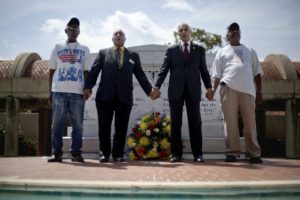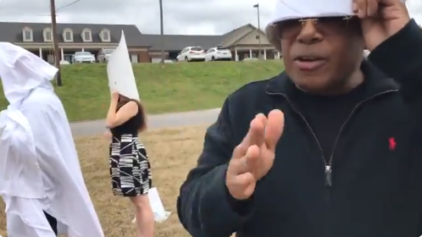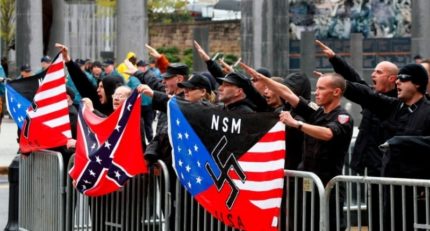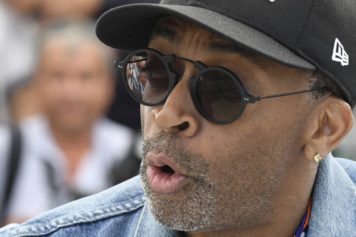
Civil rights activists and Southern Christian Leadership Conference members Ralph Worrell (from left), Dr. Bernard Lafayette, Jr., C.T. Vivian and Frederick Moore join hands and sing “We Shall Overcome” at the Atlanta gravesite of Rev. Martin Luther King Jr., marking the 44th anniversary of his assassination. (AP Photo/David Goldman)
Bernard Lafayette fought to end segregation during the civil rights movement. But after watching events in Charlottesville, Va., last weekend and hearing President Donald Trump blame both sides for the deadly violence, he realized that changing laws did not change enough hearts and minds.
“It was below the surface,” said Lafayette, the 77-year-old chairman of the Southern Christian Leadership Conference. “It was always there. It never left. People are coming out again and expressing their racist feelings.”
Nonwhites who came to the United States in search of a better life or who fought for equality were dispirited to see their fellow citizens fighting to preserve the legacy of the Confederacy and displaying Nazi symbols. And they said Trump’s response to the deadly violence only fanned racial flames.
Trump’s initial statements on Saturday blamed violence on “many sides.” Two days later, he condemned white supremacists. On Tuesday, he lashed out at the counter-protesters who had been in Charlottesville. He also questioned whether removing public tributes to Confederate figures would result in similar treatment for statues of George Washington or Thomas Jefferson — both slave owners.
On the day of the Virginia rally, Lafayette was in Lowndes County, Ala., marking the anniversary of the death of Jonathan Daniels, a white civil rights volunteer who gave his life to save a 17-year-old Black girl, Ruby Sales. Lafayette, who worked alongside the Rev. Martin Luther King Jr., was stunned to see young whites marching with torches and swastikas in 2017.
To him, it was a sad reminder that the racist attitudes of the past have stubbornly persisted despite the progress of the past half century.
Trump, he said, does not understand the counter-protesters.
“The people who had weapons, who were geared up for violence, were the other side,” Lafayette said.
The Rev. William Barber said Trump’s comments were “deeply harmful” and will embolden white supremacists.
“It was a misrepresentation of history, saying that people were just trying to preserve their culture,” said Barber, creator of the Moral Mondays movement in North Carolina. “What culture is he talking about? The culture of slavery? Of the reinstitution of white supremacy?”
Barber said those who reject racism must not be drawn into a fight.
White supremacists “want confrontation,” he said. “Let them put their agenda out there, and let us build a nonviolent, moral movement.”
Rabbi Joshua Stanton of East End Temple in Manhattan is the grandson of refugees from Germany. As he watched the bloodshed in Charlottesville, his pulse raced and his stomach clenched. He tried to make sense of images more reminiscent of the 1930s, when his grandfather — now 95 — left Berlin after a night of anti-Semitic violence known as Kristallnacht in November 1938.
“The imagery and the salutes and the chants, quite literally from Nazi Germany, are intended to scare my grandfather. They’re intended to scare me as a rabbi and a Jewish person. They’re intended to scare people of color, and they’re intended to suggest that somehow we don’t have a place in the United States,” said Stanton, 31.
Stanton said Trump’s comments make Americans feel less safe and normalize hate.
“There are two sides to many issues, but there is not much that one could possibly say in support of Nazis and white supremacists,” Stanton said. “I think he has a moral obligation as president to stand for all Americans of all backgrounds.”
The Rev. Jesse Jackson noted that last weekend’s clashes were different than those that unfolded during the civil rights movement. Back then, nonwhites were more vulnerable, with fewer protections and legal rights.
Now, there are hate-crime laws and other measures aimed at ensuring equal treatment. And not even the president can roll them back. Jackson predicted the events in Charlottesville would energize people to become more civically engaged and vote.
“To see so many Americans divided and misled is not a good feeling,” Jackson wrote in a Chicago Sun-Times opinion piece. “But you can’t panic. … You have to keep building coalitions of conscience and keep moving forward.”
Stanton was also hopeful.
“If anything, it is a call for us to not only affirm our place in the United States but our core values as Americans, and religious pluralism and cultural pluralism are at the heart of the U.S.,” Stanton said.
Aracelly Cantos isn’t so sure. The 27-year-old, who works as an organizer in New York, is a legal permanent resident who came to Queens five years ago from Ecuador to reunite with her mother.
After Charlottesville, Cantos wonders what will happen tomorrow and who will be targeted next.
“I can’t feel good. I can’t feel sure … I can’t feel safe,” Cantos said. “I am thinking about, maybe I don’t want to be here, because I am really scared for my life, and for my mother, too.”


